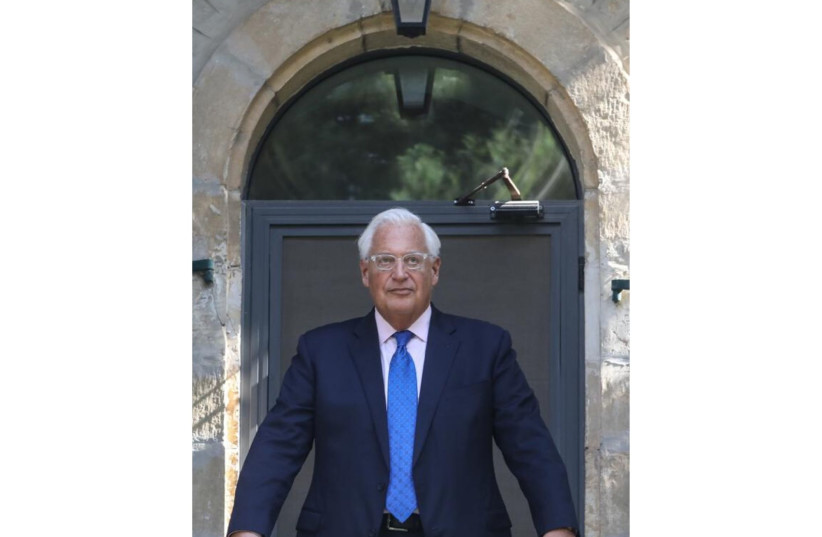Under these extraordinary circumstances, anyone, and certainly a believer and amateur theologian like me, could be excused for searching for an underlying divine message.
By DAVID FRIEDMAN

The entire world has been shut down by a microscopic microbe. Everywhere there is fear, death and suffering, and scientists, as brilliant as they may be, have yet to develop a cure, treatment or reliable therapy. Under these extraordinary circumstances, anyone, and certainly a believer and amateur theologian like myself, could be excused for seeing a crisis of biblical dimensions and searching for an underlying divine message.
I’m not talking about the age-old question of how God could let bad things happen to good people. There are almost daily events which provoke such inquiry, some even more compelling than the novel coronavirus. I struggle often with this question, no more today than in the past. Today I wrestle with a more modest issue: why did God choose a tiny virus to visit such trauma and dislocation upon the world?
As they ponder their relationship with the Creator, people of all faiths (and those who claim no faith) seek to make some sense of this incomprehensible episode. With the unexpected opportunity for deeper reflection and greater study, I humbly offer a few insights that may resonate with you.
You can win a war by staying home. Never before have such incongruous words been spoken, and yet they are repeatedly uttered by every leader across the globe. But the message is not a new one. In the book of the prophet Zechariah (4:6), God says exactly that: “Not by armies and not by strength, but only through my spirit says the Lord Almighty.” Have we become too reliant on physical power and too dismissive of the spiritual, especially when this victory will only come by strength of spirit? Perhaps this is a lesson brought to us by the virus.
We need more humility. We have artificial intelligence, big data, robotics, organ transplants and gene therapy, but a contagion jumps from an infected animal in Wuhan to a human and it brings the world to a complete stop! Plainly, there’s still a lot that we don’t know – and perhaps we are not putting what we do know to the right use. At the beginning of time, the technologists of the day conceived and began to build a tower to reach and attain the mysteries of the heavens. But they did so “to make themselves a name” (Genesis 11:4). Motivated as they were for personal aggrandizement, God made short work of the builders of the Tower of Babel. Perhaps the virus is teaching us to be more humble and less selfish with regard to our own advancements.
We are the world, but charity begins at home. The tiny virus is showing us, like never before, how interdependent we are across the globe. What happens thousands of kilometers away can affect us profoundly in short order and, whether out of self-interest or altruism, we should care what happens around the world. At the same time, we must rely upon ourselves to protect ourselves, and not have our health or welfare dependent upon foreign nations which have their own priorities. As the first century sage of the Mishnah Hillel famously said, “If I am not for myself who will be for me, and if I am only for myself what am I?” (Ethics of the Fathers, 1:14). Perhaps the virus is teaching us to do a better job finding the right balance.
Be connected but not too connected. How often do we engage with close friends or family with one eye on each other and the second glued to a smartphone. Now that we are all in isolation, the machines work fine but we have discovered the hard way that they is no substitute for personal contact. Perhaps the virus is teaching us that when this is all over, we should reaffirm the joy and value of eye-to-eye, heart-to-heart interaction as the gold standard. At the same time, perhaps the virus is also teaching – again the hard way – that disconnecting from the outside world is fraught with peril. Those who came late to social distancing because they were disconnected unfortunately have borne the brunt of the illness.
The hand of God can be at its most powerful when it is least visible. We can’t see God nor prove divine intervention in any particular act or event. But the Bible does teach us that God’s acts can be at their most impactful when not accompanied by obvious supernatural force. We learn this from the 10 plagues inflicted upon the ancient Egyptians that we will recount shortly during the Passover seder. The first nine plagues were all visibly supernatural, ranging from blood on the Nile to infestations to abject darkness and more. None of those were sufficient to convince Pharaoh to release the Israelites from bondage.
But the 10th plague was simply an illness that struck the first born among the Egyptians in the middle of the night – silent, invisible and deadly. And it was that plague which led to the Exodus. Perhaps the virus is teaching us that God remains in charge of the world even though his control is not visible in any ordinary sense.
Whether one agrees that all or some of these are lessons of the novel coronavirus, we can all agree that the lessons are painful and unprecedented. I am wishing and praying that we recover fully from this plague – physically and spiritually, individually and collectively.
Content retrieved from: https://www.jpost.com/Opinion/US-Ambassador-to-Israel-David-Friedman-asks-Why-a-virus-623384?fbclid=IwAR1IU5pnRcMg1ZHs96H4G6LNWrV55hk4p7gerKpmxUelWHTNiOWacj2K9Bg.